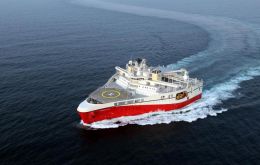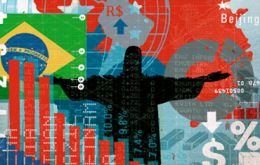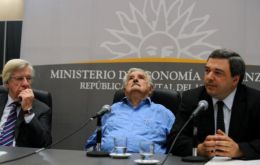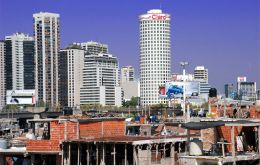MercoPress. South Atlantic News Agency
Economy
-
Thursday, January 2nd 2014 - 18:21 UTC
Falklands 2014 oil industry major focus: how to develop the Sea Lion discovery

After a busy 2011 and 2012, 2013 was a relatively quiet year for exploration around the Falkland Islands in the South Atlantic Ocean. The various companies involved in the region's nascent oil and gas industry preferred to spend the year focusing on seismic data acquisition campaigns and consolidating some of their assets.
-
Thursday, January 2nd 2014 - 15:35 UTC
New Year in Argentina brings: hikes in urban transport and fuel and promises of a capped basket

New Year arrived in Argentina with much needed rainfall relief, but also with a hefty increase in urban transport fares, the same with fuel prices at the pump and the promise of a list of 200 products included in a price agreement with the county’s major supermarkets and retailers.
-
Sunday, December 29th 2013 - 08:35 UTC
December inflation doubles in Brazil but at an annualized 5.51% remain on target

Brazil's general price index, known as the IGP-M, more than doubled in December, posting a rise of 0.60% compared with a 0.29% increase in November, the Getulio Vargas Foundation said Friday.
-
Sunday, December 29th 2013 - 08:30 UTC
Brazil ups taxes on debit cards and travelers checks to contain outgoing tourism

The Brazilian government said on Friday it will raise a tax on operations with debit cards and travelers checks made abroad, in a move that will raise the country's tax intake by 552 million Reais (234.65m dollars) per year.
-
Friday, December 27th 2013 - 05:32 UTC
Uruguay's new Economy minister pledges continuity of current market friendly policies

Uruguay will continue to consolidate its market friendly policies, pledged incoming Economy minister Mario Bergara, 48. on taking office on Thursday surrounded by President Jose Mujica and Vice president Danilo Astori. He replaced Fernando Lorenzo who was forced to resign following a major scandal involving the failure and shut down of the country's flag air carrier Pluna.
-
Friday, December 27th 2013 - 05:01 UTC
UK Met Office will offer daily forecasts about the weather in space: solar storms the target

The United Kingdom Met Office is to begin offering daily forecasts about the weather in space. The 24 hour service will aim to help businesses and government departments by providing early warnings of solar storms that can disrupt satellites, radio communications and power grids. The first forecast is expected to be available next spring.
-
Friday, December 27th 2013 - 04:52 UTC
Inflation in Argentine provinces expected to reach over 30% at the end of 2013

Consumer prices in the Argentine province of San Luis climbed 2.9% in November over October, 27.8% over December 2012 and 29.3% in the last twelve months, according to the provincial stats office. San Luis is ruled by dissidents from the ruling Peronist coalition headed by President Cristina Fernandez.
-
Friday, December 27th 2013 - 00:59 UTC
China pumps 5bn dollars to help banking system with rising interest rates

China's central bank has pumped 5bn dollars into the banking system to ease concerns over a credit squeeze that has caused rising interest rates. The People's Bank of China did not explain its actions, but over the last few days there has been growing concern over the availability of credit.
-
Friday, December 27th 2013 - 00:05 UTC
Over 10m Argentines live in poverty conditions, says Catholic University

Over a quarter of the Argentine population live in poverty conditions, with no formal job, poor quality education, dreadful housing and insufficient healthcare, according to the latest paper from the Buenos Aires Catholic University Social Debt Observatory.
-
Thursday, December 26th 2013 - 23:54 UTC
Argentina’s socioeconomic statistics: still lying after all these years, says The Economist

For years the IMF turned a blind eye as Argentina doctored its inflation index and plumped up its numbers for economic growth. Then last February the fund steeled itself and censured the country, warning it to improve its statistics by September or face potential suspension or expulsion. This threat was unprecedented in the fund’s history.
